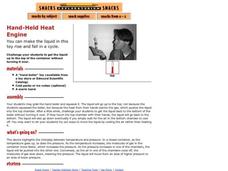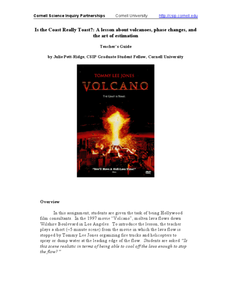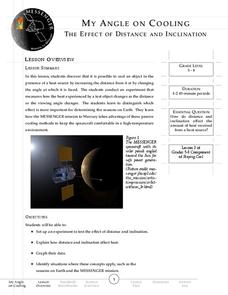Chemistry Collective
Virtual Lab: Measuring the Heat Capacity of an Engine Coolant II (Advanced Version)
Cool it! A virtual lab has users conduct an experiment to find the specific heat capacity for an unknown substance. The substance is an engine coolant, and calculating the specific heat capacity lets learners determine if it is a better...
Curated OER
Teaching about Heat Budgets of Lakes
Students investigate how much energy is stored in lake water as latent heat, calculate how much latent heat is exchanged with the atmosphere, and consider the effects of heat gain and heat loss on the surrounding environment.
Captain Planet Foundation
Solar Cooking Race
Study heat transfer with activities that focus on how heat energy works. Using a solar cooker, ice cubes, and heat transfer bracelets, kids experiment and record what they find by keeping ice cubes cold and vegetables hot.
Curated OER
How Hot Is It?
Discuss the difference between conduction, convection and radiation of thermal energy, and complete activities with your class by investigating the difference between temperature, thermal energy and the heat capacity of different materials.
Curated OER
Specific Heat of Metal
Students experiment with different types of metal by dipping them in boiling water and cool water and recording temperature changes in the water. By doing this, they find the specific heat of the metals.
Curated OER
Stop Heat from Escaping
Students explore the uses of insulation and describe how insulation helps to conserve energy. They work in groups and use plastic, wool, paper and aluminum to experiment with the heat-retaining properties of various materials.
Curated OER
Specific Heat
In this specific heat activity, students read about the amount of heat needed to raise the temperature of a substance. They are given the equation for calculating joules and they solve four problems using the equation.
Curated OER
Heat Loss and Cool Gains
Fifth graders predict what happens when cold and hot water are mixed together. In this physics lesson, 5th graders discuss how heat transfer takes place. They record temperature readings and compare it with their prediction.
Curated OER
Specific Heat
In this specific heat worksheet, students are given examples to find the specific heats of substances and to use the specific heats to find the changes in temperatures of substances. Students solve eighteen problems using what they...
Curated OER
Investigating the Effect Of Successive Heat and Cool Cycles on a Thermoplastic material.
Students investigate hot melt glue using a hot melt glue gun as an an injection molding simulator and a melt index viscometer. They evaluate the effect of heating and cooling by weighing the glue extruded over a constant time period.
Exploratorium
Hand-Held Heat Engine
See the direct relationship between pressure and temperature using these classic science toys. As individuals hold the glass bulb, the liquid inside reaches it's boiling temperature, which is just a bit above room temperature. As the...
Perkins School for the Blind
Conductors of Heat - Hot Spoons
Why is the end of a spoon hot when it's not all the way in the hot water? A great question deserves a great answer, and learners with visual impairments will use their auditory and tactile senses to get that answer. A talking...
Curated OER
For a Change
Here is a worksheet that has young scientists think about things that been changed as a result of heating and cooling, and if they can be returned to their original form. There are seven scenarios to consider, and they must choose,...
Curated OER
Calorimetry Problems
In this calorimetry worksheet, students complete 30 problems. They calculate the change in heat of a system given the mass and the change in temperature of the system. Students also find the final temperature of a reaction given the...
American Chemical Society
Heat Up and Cool Down
Don't be so dense! Using food coloring, pupils conduct two experiments with the difference in densities of hot and cold water. In the first experiment, learners add dyed hot and cold water into room temperature water and observe how the...
Curated OER
Properties of Fresh and Sea Water
Students work with three stations to demonstrate the properties of water. They explore water's boiling point, freezing point, and its ability to store heat.
American Chemical Society
Changes Caused by Heating and Cooling
It's heating up—and cooling down—in here! A hands-on lesson allows learners to experiment with melting and freezing butter to observe changes as a substance transitions between liquid and solid form. They also view an animation that...
Curated OER
Is the Coast Really Toast?: A Lesson About Volcanoes, Phase Changes, and the Art of Estimation
Clever! Use a clip from the 1997 film, Volcano, to get your chemistry class knee-deep in heat concepts related to lava. In the movie scene, lava flow is stopped in the nick of time. Your class must use calculations to determine if this...
Curated OER
Transferring Thermal Energy
Multiple examples of heat transfer through different materials are shown. The information will reinforce concepts of particle energy change and movement at a early, secondary level.
Exploratorium
Give and Take
Heat-sensitive liquid crystal sheets are available in a variety of sizes and temperature ranges. Purchase a class set of hand-held sheets and color half of each with a silver permanent marking pen. Learners of light can hold them under a...
Messenger Education
My Angle on Cooling—Effect of Distance and Inclination
When exploring Mars, spacecrafts are exposed to 5-11 times more sunlight than when near Earth. Groups of pupils complete a hands-on activity to explore how distance and angle of the sun affect temperature. Through discussions, they then...
Curated OER
My Angle on Cooling
Students explore how the angle and distance of an object can change it's temperature. After reviewing how the position of the Earth affects the temperature of the planet, student groups design and perform an experiment to test how...
Institute of Electrical and Electronics Engineers
Solar Structures
It's time to soak up the sun! Youngsters read about active and passive solar heating systems, then they collaborate to create a miniature solar-heated building. Provide a variety of materials for them to incorporate and watch their...
Curated OER
Heating and Cooling a Really Large Lizard
Remind your middle school scientists how fox ear size varies depending on the climate they live in; large ears allow heat loss while small ears keep heat in. Discuss how a cold-blooded animal might try to regulate body temperature. Then...
Other popular searches
- Heating and Cooling
- Heating and Cooling Curves
- Science Heating and Cooling
- Heating and Cooling Curve
- Heating Cooling Curves
- Heating Cooling Curve
- Heating and Cooling Energy
- Heating and Cooling Systems
- Milk Heating and Cooling
- Heating and Cooling Water
- Heating Adan Cooling Curves
- +Heating and Cooling

























